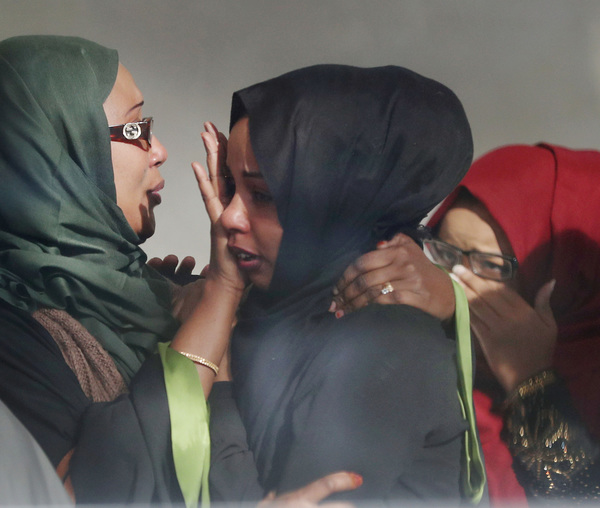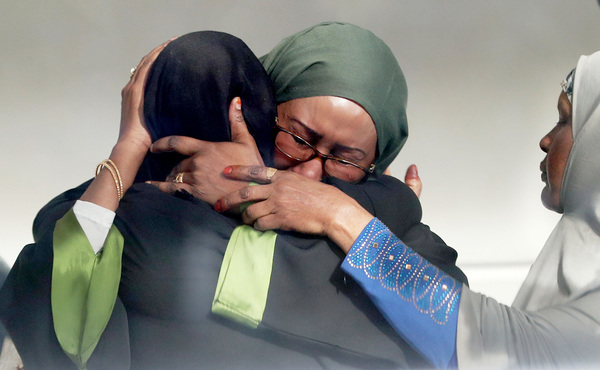
MINNEAPOLIS _ The nation's largest Islamic State recruitment case reached the sentencing phase in a Minneapolis courtroom Monday, with two defendants receiving relatively light penalties that reflected their cooperation with the government and a third getting 10 years in federal prison.
Abdullahi Yusuf, 20, was sentenced to time already served, one year in a Twin Cities halfway house and 20 years' supervised release. Yusuf pleaded guilty early, testified against three co-defendants at their trial last spring, and is participating in the nation's first jihadi rehabilitation program, offered through a Minneapolis nonprofit.
Explaining his thinking to a packed courtroom Monday morning, Senior U.S. Judge Michael Davis said the federal prison system has no services to de-radicalize a defendant like Yusuf and, in a poignant moment, said even a short prison sentence could lose an opportunity to turn the young man's life around.
"It doesn't make sense for me to send him to prison," Davis told the courtroom. "I hope I'm not wrong."
"I won't let you down, your honor," Yusuf replied.
Minnesota's top federal prosecutor, U.S. Attorney Andrew Luger, commended Yusuf for cooperating with the government, but said his office struggled to come up with an appropriate sentence. He praised Davis for allowing Yusuf to continue his rehabilitation, adding: "The hard work of rehabilitating those who seek to engage in ideological violence must continue."
A second defendant, Abdirizak Warsame, appeared before Davis about two hours later and received 30 months in prison. His attorneys had asked for 18 months, while federal prosecutors recommended 54 months.
Warsame, 21, also pleaded guilty and cooperated with the government. Unlike the other eight defendants, Warsame never actually tried to leave the United States for Syria, but was described by some of the other defendants as a leader of the conspiracy.
Before imposing sentence, Davis told Warsame: "I don't believe you're still not a jihadist," adding that he remained suspicious about the young man's behavior after he was arrested. "For the next round of sentencings (defendants who did not assist the government), "it's a whole different ballgame," Davis added. "So count your blessings."
Speaking outside the courtroom, Warsame's mother said she had mixed emotions about his sentence.

"My expectation was my child to go with me home," said Deqa Hussen, choking on her words. "But I am happy with what the judge gave my son. I know he changed." Then, raising her arms toward the sky, she added, "Thanks to God, Allah. My child has been stopped. My son is alive."
The day's third defendant, Zacharia Abdurahman, got 10 years in prison. Abdurahman, who at one point tried to leave the country at New York's John F. Kennedy airport, pleaded guilty last year but did not assist the prosecution. Federal prosecutors had asked for 15 years.
The sentencings, which will continue Tuesday and Wednesday at the federal courthouse in Minneapolis, follow a dramatic yearlong FBI investigation of terrorist recruiting in Minnesota's Somali community.
Nine young Somali-Minnesotans were ultimately convicted of conspiracy to support the Islamic State in Syria and the Levant, or ISIL. Six pleaded guilty; three were convicted at trial under charges that also included conspiracy to commit murder abroad.
The sentences Davis began handing down Monday morning are expected to draw an international audience of jurists and prosecutors curious about his approach toward de-radicalizing young extremists and preventing homegrown terrorism.
Monday's hearings drew an emotional crowd of relatives, friends and members of the Twin Cities Somali community to the courthouse in downtown Minneapolis as the hearings began.
"I'm very happy," said Sadik Yusuf, father of the first defendant. "It was very tough. We appreciate the judge."
The elder Yusuf said his son's decision to cooperate with prosecutors jeopardized the family's relationship with the Somali community.
"We have seen difficult reactions from the community. (But) I am confident that there is a big difference in my son yesterday and today. He will not reoffend. He will take advantage of his future, and he'll succeed."







